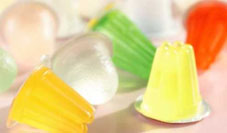
A helping hand with solutions
To achieve sustainable growth, manufacturers must deliver innovative, exciting products, leading to a continuous process of evolution, in search of new product concepts and emerging opportunities for exploiting ingredients and combinations of ingredients. As one of the world's leading suppliers of texturizers and emulsifiers to the global food and beverage industry, Cargill Texturizing Solutions offers specific answers to providing texture in multiple food applications, including desserts and water jellies, based on a wide palette of ingredients, including hydrocolloids, emulsifiers, and lecithins. Traditionally, gelatin was used for setting jellies but recently, religious and health considerations, and concerns about heat stability during storage and transportation, have influenced manufacturers to use various types of replacement vegetarian-based gum, such as carrageenans (seaweed extracts). Among these are those extracted from red seaweed, such as Cargill's "Satiagel" and "Satiagum" ranges that are highly effective in setting jellies.Different solution for different textures
The combination of carrageenans with locust bean gum, extracted from a seed of the carob tree has proved a successful manufacturing process. The "Viscogum" series of locust bean gum products has good synergistic effects with carrageenans to produce a softer, more elastic texture. By exploiting this synergy, manufacturers can prepare gels with different textures to suit their requirements, ranging from brittle to elastic, or firm to soft jelly textures. A ready-blended hydrocolloid texturizing solutions, convenient for manufacturers while offering better quality management in production, is also available. Using its extensive technological and applications expertise, Cargill provide a range of blends under the "Flanogen" brand to meet different consumer needs in Asia. Translucent water jellies can be easily and cost-effectively created using the special Flanogen CWL systems based on carrageenan and locust bean gum extract. For very clear water jellies, Flanogen BWR systems are used. The Flanogen CWK systems are based on konjak and carrageenan, creating a cost-effective elastic texture, the elasticity of which can be varied according to market preference. Konjak, which is price-competitive compared with other hydrocolloids, is widely used in water jellies due to its elasticity.Targeting a broader market
To achieve sustainable growth manufacturers must target a broader market ?one that covers a wide adult consumer spectrum, including the elderly, adolescents and those who are managing their weight. Cargill offers a wide range of texturizing solutions to help manufacturers exploit the potential for healthy, fat-free and low sugar jellies, which appeal to health-conscious andMen's Sneaker Hub Online













